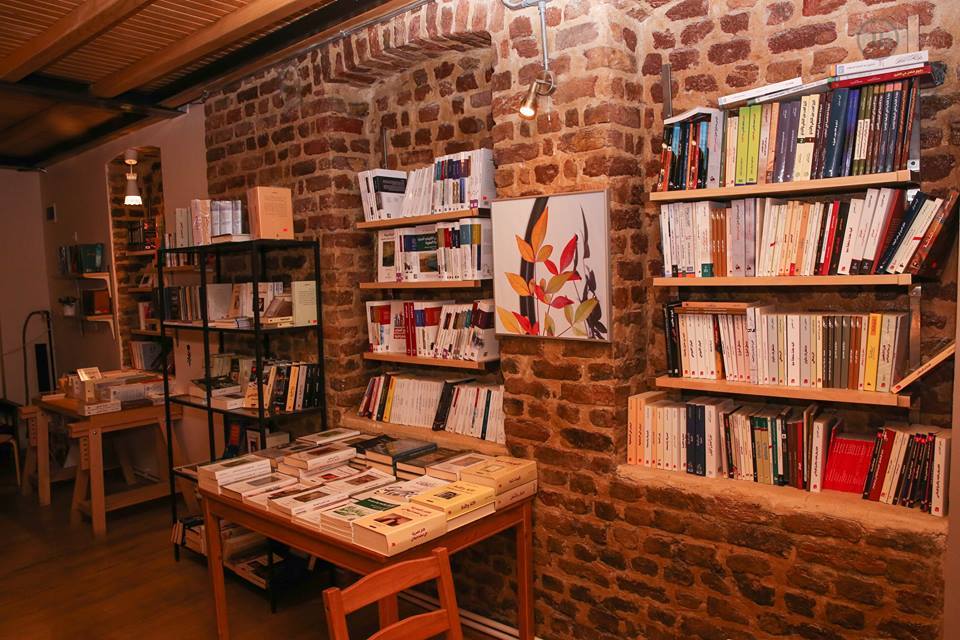Syrian couple turns a new page in Istanbul

After fleeing Damascus, Gulnar Hajo and Samer Kadri opened an Arabic-language bookstore and cultural centre in Istanbul. Photo: Al Jazeera
In the quiet Istanbul neighbourhood of Fatih, across from a shady square, an inviting doorway beckons to visitors.
Pages Bookstore Cafe was established two years ago by Gulnar Hajo and Samer Kadri, a Syrian couple whose love of publishing and literature has led them on a big adventure.
They started up Bright Fingers, a children s publisher, in Damascus in 2004, authoring and illustrating some of the titles themselves. But after Syrian security forces raided their offices in 2012, the couple fled the country, winding up in Istanbul. Although the city hosts many Syrian refugees, they could not find a store focused on Arabic-language books - and from this realisation, Pages was born.
The bookstore quickly became a success, serving as a space for members of the Arab community to come together to read, drink coffee, listen to music and watch theatre performances. Last June, Hajo and Kadri expanded their vision, opening a second Pages outlet in Amsterdam.
Sitting down with Hajo in Istanbul, Pages, art and the search for community were discussed.
You and Samer were publishers initially. What made you decide to create a bookstore cafe and cultural space?
We were very aware that there were no Arabic-language bookstores here. When we travelled to book fairs in the region, friends would ask us to bring back Arabic books for them. That was how we made the decision, to fill a need.
Syrians and Arabs living here needed that space and wanted to be able to find books in their mother tongue. It was a gamble, but we re used to hard work.
How about the activities you offer? Have they added to Pages identity?
First and foremost, we re a bookstore. And we are a library, so if someone wants to come and sit here and read a book and have a tea, they re welcome.
We also hold cultural activities in Arabic: classes in theatre, cinema and music, and kids art workshops. Every Saturday evening, we host an Aleppan group that plays classical Arabic music. This is in addition to book signings and art exhibitions. Other than the actual sale of books, every activity we offer is free of charge.
Of course, the idea for this place changed as we were working on it, from a bookstore to a cultural centre. And now we have people coming in here to enjoy our activities, which is very rewarding and has expanded our identity.
Why did you decide to expand to Amsterdam?
The idea came from the many people from northern Europe who passed through here; some were visiting Istanbul and discovered Pages, others looked for it because they had heard about us.
They all said the same thing - they wished there was a similar space in northern Europe. So, we had this idea of expanding northwards, then Samer was invited to visit Amsterdam, where he met some people who offered to support the project.

The building stands quietly in an inner street of the historical district of Fatih in Istanbul, Turkey. Photo: Al Jazeera
What ideas do you aim to get across through your own writing and illustrations?
When I write, I go to children s problems, what they feel. Many of my books deal with that, such as When I Am Angry, When I Am Sad, and Missing Colours.
With regards to illustration, I ve met a lot of people in the Arab world who dismiss my trade: "Oh, you re a children s illustrator." Illustrating is so important to me; my focus when illustrating is to present our children, Arab children, with art that doesn t lose that Arab identity.
I wouldn t want my work to be "very good" but a replica of something Western; that defines my work, the inclusion of our culture, not a tourist-packaged culture, but elements of beauty that exist in the Arab world.
When you interact with children, do you take inspiration from them?
I get a lot from kids workshops. I mean, look, if you re a writer or illustrator for children and can t communicate with them, you re no good. You have to understand what they re thinking about.
Children are so intelligent and discerning; I ve never dealt with them as cute little things to gurgle at.
Some say that places like Pages - where Arabic language, literature and arts are celebrated - slow immigrants integration into their new home. What do you think?
I don t know why it has to be so complicated. If you take the average Arab immigrant - they re Lebanese or Egyptian or Tunisian - in the end, they re Arab. They shouldn t feel pressure to end that.
I mean, if a Norwegian family moves to Cairo, will they stop reading and speaking in Norwegian? No, they will keep speaking it at home, keep reading it.
They will guard their culture that way. But for Arabs, there is a pressure to leave behind their culture, almost as if we lack the self-confidence to maintain who we are.
This story originally appeared on Al Jazeera.


